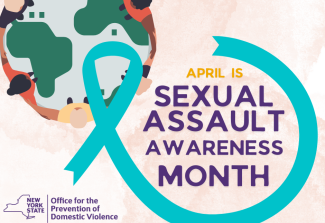Students Find Comfort, Healing in Furry, Four-Legged Therapist
SUNY Plattsburgh welcomed a new counselor to the Student Health and Counseling Center this past fall.
Boris Karpenko is quick to put his clients at ease, whether he lets them reach out first or they let him make the first move.
The half-bull-mastiff/half-Tamaskan dog offers his services as a certified therapy dog under the love and watchful eye of Inga Karpenko, a human licensed mental health counselor at the center. But Boris’ temperament is so calming, Karpenko doesn’t have to spend too much time hovering.
“Boris is a very-good-natured, quiet dog,” Karpenko said. “During therapy sessions, he is careful approaching clients; he lets the students pet him; he’ll put fluffy toy in their laps.”
Boris came by his status as a member of the staff — his photo and bio are on the counseling center’s webpage — organically. Karpenko, who hails from Russia by way of New York City, came to campus in 2020 as a Behavioral Health Services North contract counselor. Hired by the college in 2021, Christy Minck, assistant director and coordinator of psychological services, saw her walking Boris out in the community and suggested training him as a therapy dog.
“Christy nurtured the idea that he’d be a good addition for our students,” Karpenko said. Boris was certified last summer by the Alliance of Therapy Dogs.
Totally At Home
“When I brought him in (her office), he took a little time to feel comfortable, and now he feels totally at home,” Karpenko said. Counseling sessions with Karpenko and Boris may involve just interacting with the dog or combination of interactions, Karpenko said. And they have myriad reasons for wanting to work with Boris.
“Some may have lost their own pets and find comfort in Boris; others just want to pet him while they’re in here with me,” she said.
“For some, it helps them practice assertiveness. They tell him commands and enforce
boundaries. It helps when they have to tell him ‘no’ and direct him in his behavior,”
she said. “Students who struggle with conflict resolutions and effective or assertive
communication find a therapy dog helps in the most non-threatening way to practice
with my guidance, making sure both are OK.”
“I think dogs, as well as other animals, are able to provide comfort for people that humans are not able to,” said Gabrielle Rodriguez, graduate student in early childhood education. “Boris helps me a lot just by being present in the room.”
For Boris’ part, he knows when he’s “on,” Karpenko said.
“This is a specific space for him to come; it’s different from home. He has a different demeanor here. He’s not as relaxed. He’s tired when he gets home. He knows why he’s here; he’s working.”
Recognizes Reactions
Part of Boris’ training as a therapy dog is to recognize signs that suggest a student’s reaction. Karpenko said he knows when students are emotional, overwhelmed, crying.
“He’ll put his head in their lap or on their shoulder,” she said.
“Boris helps me a lot just by being present in the room,” Rodriguez said. “There are many times when I feel upset, experience anxiety or become triggered by something and look for comfort within my support system. I love and appreciate my friends and family that make up my support system; however, sometimes it feels as though they are continuously searching for the right thing to say or do in the hopes of fixing whatever it is that I am having a hard time with. With that thought in the back of my mind, it adds to the uneasy feelings that I was already experiencing and makes me wish I didn't say anything to them at all.
“During my sessions, when there are times of silence due to frustrations, sadness, etc., I know that if I needed or wanted to, I could sit on the floor and be hugged without the feeling of having to explain or justify myself. I can give head rubs and pets, to alleviate any feeling of restlessness or anxiety that I experience,” she said. “I can play with Boris and his toys while feeling this way and have a mild distraction from whatever it is I am working through. The acceptance that I am being loved and wanted even when I am feeling like I have no worth is something that for me, is hard to feel and experience from people.”
Greets Students at the Door
For sophomore Alexys Hawks of Beekmantown, Boris knows just what she needs as well.
“Therapy animals have actually been a big part of my mental health journey over the past few years, starting when I was a senior in high school,” said Hawks said. “Boris specifically helps me because he always greets me at the door, and once I sit down he comes over and sniffs me before placing his head in my lap. This occasionally happens after Inga and I take him for a short walk and talk as we're going.”
“I saw Inga walking him along the river in November,” said senior magazine journalism major Kiyanna Noel of Brooklyn. “When I saw this fluffy, friendly dog, I just had to pet him and arrange when I would be able to see him again. I’ve only seen Boris about three times, and each time he was gentle, sweet and begged for treats.”
Noel said that Boris helps her by reminding her “to be calm and to just relax, which is hard for me as a college student balancing being a full-time student, partaking in publications and balancing my mental health.”
More Certified Animals Needed
“I wish Boris was around all the time and there was more access to him and other certified animals because I do believe there are positives in having certified friends,” she said.
“Inga and I have talked about how Boris is very good at sensing anxiety, and that is when his presence is most appreciated,” Hawks said.
Rodriguez said the combination of Karpenko’s support and Boris’ presence helps her get through her days.
‘Helps Me Feel Hopeful’
“Throughout my personal journey, there are many instances where hard, traumatic, and
uneasy topics are talked about/are in the process of being worked through” she said.
“I know that I 100 percent have Inga's support and that feels amazing. The added unconditional
appreciation, love, and light hearted energy that I feel when Boris is in the room
helps me feel hopeful that I won't be stuck in this deep valley that I am currently
living in.”
When he’s working, he wears his therapy dog bandana and a heart therapy dog tag. His certificate hangs in Karpenko’s office alongside her own degrees.
“It’s exciting to be able to offer this unique service to our students,” Karpenko said. “And he’s recognized across campus. Students call out when we’re walking. They call out to him, not to me.”
For more information on counseling services at SUNY Plattsburgh, call 518-564-2187 or email [email protected] or visit https://www.plattsburgh.edu/plattslife/health-safety/health-counseling-center/.
Photos/Story by Associate Director of Communications Gerianne Downs
News

SUNY Adirondack Students Benefit from New Dual Agreement with SUNY Plattsburgh Queensbury

SUNY Recognizes Two Plattsburgh Seniors for Excellence in Academics, Leadership
